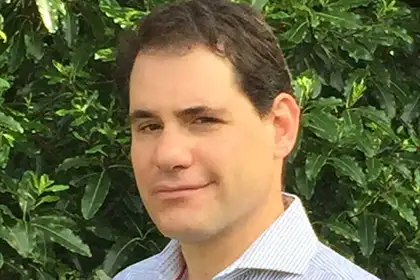
Associate Professor Bryan Walpert.
Poet Bryan Walpert asked his students to do a word list for a writing exercise and gave it a go too. The resulting poem is a finalist in the prestigious Montreal International Poetry Prize, worth $CAN20,000.
An associate professor of creative writing at Massey University’s School of English and Media Studies, Dr Walpert has had his poems recognised in the biennial competition ever since it was launched in 2011.
This year, his poem titled "Tranquil" is one of 50 finalists selected by an esteemed panel of international judges from more than 2200 entries from 70 countries. All finalists will be published in a Global Poetry Anthology by Véhicule Press in Montreal later in the year. One will be the selected winner by the final judge.
The poem was developed from a writing exercise in his level two Writing Poetry course. In it, he asked students to come up with a list of words that in some way appeal to them, and then to put a subset of these on the board before asking them to write a poem that includes a dozen of those words.
“The idea is to help students to see what’s possible when they follow language, rather than follow their intentions,” says Dr Walpert, who is based at the Auckland campus in Albany.
“The language on the board leads them to meaning – they see that it’s possible to discover meaning rather than to come to a poem with, say, a message already worked out in their heads to be transcribed by finding the right words for it. I often get some excellent results by students from this prompt, in addition to their realising what it feels like to discover a poem if they let go of their preconceptions.”
He says he usually writes down the words the class is working on and often writes his own poem based on them.
“I typically do not share my poem with the class, as I want the focus to be on their work, not mine. But I feel I can benefit as much as they can from the discoveries that language permits. This poem [Tranquil] was the result of such an exercise that I assigned to a class several years ago. I recently came back to the draft, revised it then submitted it to the Montreal prize.”
‘Tranquil’ was one of the words students put on the board and although he can’t recall the full list of words from the board, he is sure the words ‘couch’, ‘queen’ and ‘snow’, were among them. The poem evokes the bitter-sweet act of writing and reflecting on the meanings – once shared, now divided up – of possessions, and the loss of possibilities they embodied.
He says this is the third time he’s published a poem that came out of this exercise (though the first one to be published through the Montreal prize). This year’s competition is the second time he has made the short list; the other was in 2013, with the poem “Aubade”, featuring the Manawatū’s iconic wind turbines as a central metaphor.
In 2011 and 2015 he made the long-list with poems titled “There is no narrative” (2011) and “Smoke” (2013).
The short-listed poems, including Dr Walpert’s, will appear gradually (five per day for 10 days) from 15 August on the Montreal International Poetry Prize website. This year’s judge is Scotland-born Michael Harris, who grew up in Montreal, has written seven books of poetry, won several awards and is a prolific poetry editor.
The Montreal International Poetry Prize is a non-profit organisation with new editors and judges chosen each year, and staff “comprised of poetry lovers with diverse backgrounds who want to get poets together from all over the world in the spirit of fun and competition, to consider the various Englishes of the world and to think of poetry in global terms,” according to its website.
US-born and educated, and a New Zealand citizen, Dr Walpert published Native Bird (Makaro Press) in 2015, his third poetry volume. Read more about Dr Walpert's writing here.